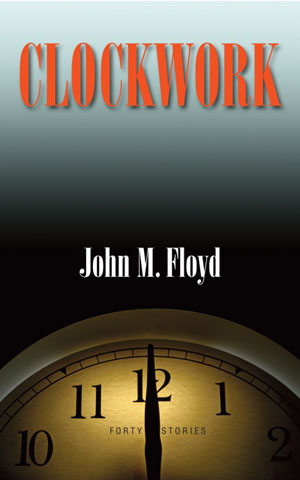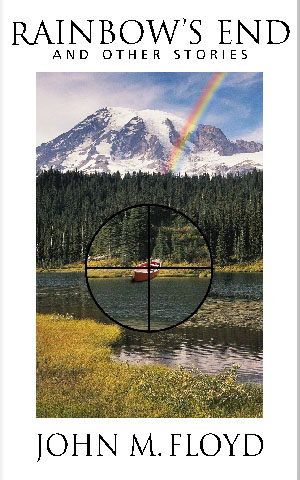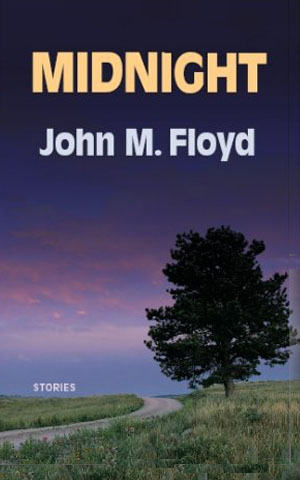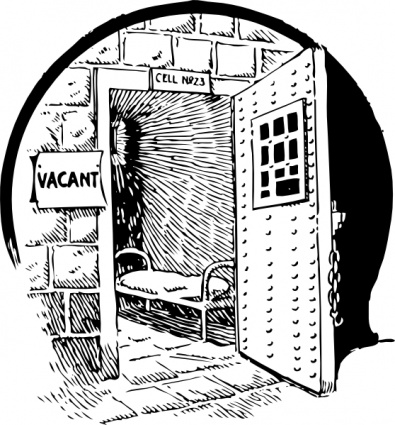Saturday, April 16: Mississippi Mud
PAGES of STORIES, Part I
Weekend Giveaway
by John M. Floyd with Leigh Lundin
Last May, James wrote an article about a new short story publication called Pages of Stories. Yesterday they achieved their first anniversary, which is good news for any startup, but especially in this tight economy. This publication will interest readers for another reason– it features two Criminal Brief writers.
 |
|
Darlene Poier
|
|---|
Besides Pages of Stories, John regularly appears in The Strand, Alfred Hitchcock Mystery Magazine, and is approaching his 37th story in Woman’s World’s April 18th issue, with yet another to appear shortly.
Issue two of Pages of Stories featured John Floyd’s Weekend Getaway. Darlene Poier, the charming editor of PoS has given us kind permission to reprint the story here on Criminal Brief.
Moreover, to celebrate Pages of Stories’ first birthday, Darlene is giving away three subscriptions. One of those recipients could be YOU. Winners will be chosen from those who comment Saturday and Sunday, so be sure we have your up-to-date eMail address. Say something clever, because Darlene’s hinted it might not be a random drawing. And now, John Floyd…
Weekend Getaway
by John M. Floyd , courtesy of Pages of Stories
, courtesy of Pages of Stories
At 8:40 on a clear Friday night in July, Jesse Pratt escaped from Building A at Crow Mountain State Penitentiary, stole a pickup from the staff parking lot, and promptly drove it into a lake some fifty yards away. The truck was located; Pratt was not. Workers were dragging the lake bed for his body when sheriff’s deputies Ed Moody and Jenny Weir arrived the following morning.
Neither of them had ever been inside the facility before, and their uniforms and credentials weren’t as intimidating here as they were in the outside world. It took them twenty minutes to locate someone who could answer their questions.
“You sure he didn’t make it out?” Weir asked. The warden was away on vacation, but if he looked any tougher than the assistant warden—a scowling giant named Sid Braxton—Weir wasn’t sure she’d want to meet him anyway.
“Positive,” Braxton said. “We got it all on tape.” He studied the two deputies. “You the only folks coming?”
“The others’ll be along soon,” Moody said.
The tape was from a videocam mounted on the prison roof. Six cameras watched the grounds every night from dusk to dawn (8 p.m. to 6 a.m. this time of year), and the one aimed south had filmed the final moments of Jesse Pratt’s miserable life, from the time the stolen Ford Ranger exited the lot to the time it entered the lake. The assistant warden left Weir and Moody alone to fast-forward through the videotape, looking for any possibility that Pratt might have escaped the submerged vehicle.
“He’s a goner,” Moody agreed, after the third viewing. Throughout the tape, the entire lake was as still as a glass tabletop and well-lit by both the moon and surrounding lights. Nothing broke the surface and no one came ashore, in orange coveralls or otherwise—at least on this side. The far bank, where the employees’ families lived, was also illuminated, but was more than a hundred yards away.
“We’re goners too,” Weir said, in a low voice, “when the state cops show up.” No one had yet questioned the two deputies’ presence here—it was, after all, their county, and the sheriff was out with the flu—but that wouldn’t last long, even in this remote outpost. Jenny Weir’s unspoken hope was to uncover some telling evidence about this odd-sounding “escape attempt” before the state investigators swaggered in with their square jaws and crewcuts and sunglasses and pointed her and Moody to the door. Or assigned them to go fetch burgers and fries for the team.
Weir rewound the tape and watched it again while Ed Moody left to interview the guard Jesse Pratt had overpowered during his ill-fated bid for freedom. Weir also asked for access to the prison’s personnel files, and—surprisingly—received it without too much difficulty. She had finished reading Pratt’s record and was halfway through the staff bio sheets when Moody returned.
“Nothing new,” he said. “I think we’re done here, Jen.” He ran a beefy hand through his hair. “There’s a cafeteria down the hall. Want some lunch before we go?”
“Hold on,” Weir said. She put down her files and picked up the VCR remote.
“You’re not hungry? That’s a first.”
“Shut up and look at this.”
He leaned over her shoulder, which didn’t involve a lot of movement: the room was barely large enough for the two of them.
She paused the tape. “Those houses there, across the lake”—she pointed to the screen—“are used by the staff, right? Guards, office workers and such?”
“That’s what Braxton said. His is the white one-story and Warden Zell’s is the bigger one with the boathouse. Why?”
“And the stolen truck belonged to the warden,” she said. “I suppose the keys were left in it?”
“Probably. Braxton said most folks here don’t even lock their houses. It’s a secure facility—they worry about break-outs, not break-ins.”
“That’s what bothers me.”
“What do you mean?”
She blew out a sigh. “This feels wrong, Ed. Why would somebody steal a vehicle inside prison gates, knowing he’d never get out?”
“Who knows how these people think?” Moody said. “And who cares? He didn’t make it to the gate.” He straightened up and cracked his knuckles. “Come on, let’s leave this for the big boys to handle.”
“And something else. Braxton told us Warden Zell hated Pratt.”
“So?”
“He also said Pratt was recently moved here from Dahlman Correctional. Said he was there two years, before coming here six months ago.”
“I heard him. So?”
“The town of Smithfield’s in Dahlman County. Pratt grew up there.” She held up a file folder. “So did the warden.”
“What exactly are you saying, Jenny?”
“I’m saying that’s a pretty big coincidence, both of them from the same town.”
The little room fell silent as they studied each other. Outside, they heard men’s voices, echoing footsteps, the clang of a steel door. Prison sounds.
“How much longer did Pratt have?” Moody asked.
“On his sentence? Four more years.”
He looked at the clock on the wall. “Don’t tell me you want to ask these people more questions.”
“Just a few,” she said, pushing back her chair. “I won’t be long.”
“I hope not—the cafeteria closes at one.”
#
Smithfield, Jenny Weir discovered, was also the hometown of the warden’s wife. Cynthia Zell had not accompanied her husband on vacation; she’d stayed home this time, while he went scuba diving with friends in the Caribbean.
“He loves the ocean,” she told Weir, in the elegantly furnished den of their house across the lake. It was almost noon, and they were sipping iced tea like old friends. “But I like it here. We have a cabin nearby—I’ve been driving up a couple times every Saturday, to paint the summer foliage. I’m an artist as well as a musician, you know.”
“A cabin?”
Cynthia Zell smiled. “I know what you’re thinking. Tropical vacations, BMW in the driveway, a second house in the mountains—on a warden’s salary?”
“Not at all. I only meant—”
Mrs. Zell leaned forward, raised an eyebrow, and whispered, “My uncle’s the governor.”
“The state governor?”
“My mother’s brother.”
“Is that so.”
Through the open window Weir could see the lake, the immaculate back lawn, and one corner of the boathouse. There were no shrubs anywhere, no hedges, no board fences. She thought of the cameras on the prison roof and decided the open spaces—the clear lines of sight—were probably intentional.
She cleared her throat and said, “This cabin—have you been there this morning? I mean, today is Saturday, right?”
“I have, yes. For the sunrise.” Mrs. Zell checked her watch. “I plan to go up again for lunch.”
“Don’t worry, this’ll only take another minute. I was just wondering—did your husband know the escapee who drowned last night? Jesse Pratt?”
“You mean they found the body?”
“Not yet,” Weir said. “Did he know Pratt? Personally, I mean?”
“I suppose he knows all the inmates.”
“I understood he especially disliked Mr. Pratt.”
“I wasn’t aware of that.”
Weir nodded, thinking. “And did you know him?”
“The prisoner?” Mrs. Zell blinked. “Certainly not. Why?”
Instead of answering, Weir made a point of concentrating on her notepad. Somewhere nearby, a crow cawed.
“Are you aware that your quarters can be seen by the security cameras across the lake?”
“Of course. Everything can.” Mrs. Zell took the lemon slice from the rim of her glass and squeezed it into her tea. The musical rattle of ice seemed appropriate for the summer day. “I believe that’s the cameras’ purpose,” she added.
“Well, I watched what was taped, Mrs. Zell, in the hours following the accident last night. And I noticed you walking from your boathouse to your back door, around nine.”
Cynthia Zell looked amused. “You could tell it was me? From that far away?”
“Only by your blond hair. May I ask what you were doing out there so late?”
“I called my husband, on my cell phone. We talked an hour or more. Reception’s better out back, and there are chairs in the boathouse.”
“Of course.” Weir turned again to the window. In the midday sun, the lake’s surface was as still as a painting. “One other thing. If your husband’s out of town, why was his truck—the one Pratt stole—parked in the staff lot last night?”
“It’s not his, it’s ours,” Mrs. Zell said, the amused expression still on her face. “I drove it over yesterday to loan a book to one of the guards. It was such a pretty day I walked back.”
“I see. So I guess you drove the BMW to your cabin this morning?”
“No, I took our minivan—it’s in the garage. Why?”
“No matter. Just wanted to check.” Weir drained her tea glass, set it down, smiled, and rose from the chair. “Well. I certainly appreciate your time.”
“My pleasure. No one better understands the demands on a law officer,” Mrs. Zell said, “than the spouse of a law officer. I suppose the saying’s true, isn’t it.”
“What saying?”
“The men in blue never rest.”
“Or the women,” Weir said.
#
Ten minutes later Jenny Weir stood beside an oak tree two houses away and watched Cynthia Zell steer a Dodge minivan down the street and out the prison gates. Then Weir phoned Moody on her cell.
He told her they’d still not located the body. A strange thing, since it should’ve been found at or near the crash site.
Maybe not so strange, Weir thought. She updated him on her conversation with the warden’s wife. She could hear muted voices in the background.
“So what do you think?” Moody asked her.
“I’ll tell you in half an hour.”
#
Actually, it took twenty minutes.
“Moody?” she said, on the phone again. “Ask Braxton the location of the warden’s cabin, and come pick me up. You and I are taking a drive.”
“What do you mean?”
“Guess what I found in Mrs. Zell’s bedroom drawer.”
“A search warrant, I hope.”
“A blond wig. And—get this—romantic letters from our drowned escapee.” She took the phone from her ear long enough to ease out onto the porch and shut the unlocked front door behind her. “It wasn’t Cynthia Zell we saw crossing her yard. It was Jesse Pratt, in disguise.”
“What!?”
“She’s the governor’s niece, Ed. She and Pratt must’ve known each other, years ago. She got him transferred here, I’d bet my badge on it.”
“You might be doing just that,” Moody said. Then, after a long moment: “You sure hunger isn’t affecting your brain?”
“I found something else too. More hidden evidence.”
“Oh God.”
Weir couldn’t help grinning into the phone. “Remember I told you Mrs. Zell verified that she left her keys in the truck, in the parking lot? Well, that wasn’t all she left there.”
“You found something else in the truck?” he asked. “How? It’s still underwater.”
“What I found wasn’t in the truck anymore. It was in the boathouse.”
“The boathouse?” A long silence. “Don’t tell me. A written confession?”
“Almost as good.”
Another pause. “I give up—what’d you find in the boathouse?”
“An orange jumpsuit,” she said. “And scuba tanks.”
#
The cabin was twelve miles south, at the end of a middle-of-nowhere dirt road. The two deputies interrupted a cozy lunch between Cynthia Zell and Jesse Pratt himself, freshly shaven and dressed in a dry set of clothes.
“Too bad it’s not a women’s prison, Mrs. Zell,” Weir said, while she held her revolver on them and Moody clapped them in handcuffs. “You’d only have to move across the lake.”
She and Moody delivered them bound and cursing to the assistant warden at about the same time the caravan of state authorities was arriving to begin its investigation. Jaws dropped; reports were filed; bitter confessions were taken. The governor, sheriff, warden, and media were notified. Commendations were promised.
For Weir and Moody, lunch was indeed late—a pair of Big Macs in the car that afternoon, on their way back to the office.
A meal never tasted so good.
THE END
 |
 |
 |
Tommorow: Pages of Stories (sur)prizes!
Need a gift? Subscribe to Pages of Stories in .pdf, .epub, and on-line. See you tomorrow for more from Pages of Stories.





















Nice! Can imagine Hitchcock’s outro to this as a t.v. episode. Seated of course at an elegant table, half-eaten burger on a plate: “I wanted to offer you something tasty to finish up this meal but unfortunately my waiter seems to have been rushed back to his regular job in the Sing Sing kitchen. So we will have to make due with this tasty morsel from our sponsor…”
Jeff, I can hear Hitchcock’s voice!
Thanks, Jeff. That sounds exactly like something Hitch would’ve said. I loved his intros and outros. (And I think you — and I — probably watched too many of those shows!)
Sincere congrats, Darlene, on the first anniversary of POS.
Congratulations Darlene on your first anniversary! Let’s see… first year is paper and cotton. I think a certain somebody deserves a first edition Alice Munro’s The Progress of Love and new Snuggley to chase away those cool Canadian spring nights!
Radical feminist that I am, I always enjoy a female cop and a female perp.
Terrific job, John.
Terrie
American cops and villains! Entertaining reading. Tightly written, nicely paced, but I guessed what had happened.
Could it be that the female, be it cop or reader, is definitely smarter than the male?
You know it, Rowan.
But the guys are smart enough not to answer!
Okay, I confess. I don’t read CB everyday.
I tend to read Leigh on Sunday AM, then keep going until I’ve read the entire week– just backward.
Your story has changed my approach. I’ll be reading each day from now on, so I don’t delay something so well-written and that entertaining. My mysteries are not the EQ or AH type, but, as a child, my Sunday mornings were spent going to the newstand and out to breakfast with my dad while my mom slept in. The best Sunday mornings were when the newstand had new issues of Ellery Queen or Alfred Hitchcock magazines!
Thanks for a great story!!!
fran
Hello Everyone!
I love the comments and all the interaction! This is a highly entertaining blog.
Thank you all. It’s been a fantastic and exhausting weekend but I would do it all over again in a flash. I’m now even more excited about what the second year will bring.
I really enjoyed John’s story each time I read it. I must confess, I’ve been a fan of Ellery Queen magazine most of my life and when I saw John submit a story… well I was honoured. I’m proud to have published it. But John…when’s the next one coming?
Thank you Cindy for your suggestion. However, I’m not sure only one new Snuggley will do it! May have to search for 3 or 4.
Thank you again everyone and I’m looking forward to the next year and seeing even more stories from the very talented authors that comment and contribute to this blog!
Darlene Poier
Publisher
Pages Of Stories
Thanks to all for your kind comments.
Darlene, the honor is mine — many thanks. As for your question, I’ll certainly be sending another story to you for consideration shortly.
I must correct a piece of misinformation that I supplied to Leigh: I only just discovered that my current story in Woman’s World is in their April 25th issue, rather than April 18th. My bad.
Hope all of you have a great week! Thanks SO much for hanging with us here at Criminal Brief.
Darlene and John, thanks for allowing CB to republish John’s story. That set the stage much better than anything else we could have done.
Thanks also to readers– you are terrific!